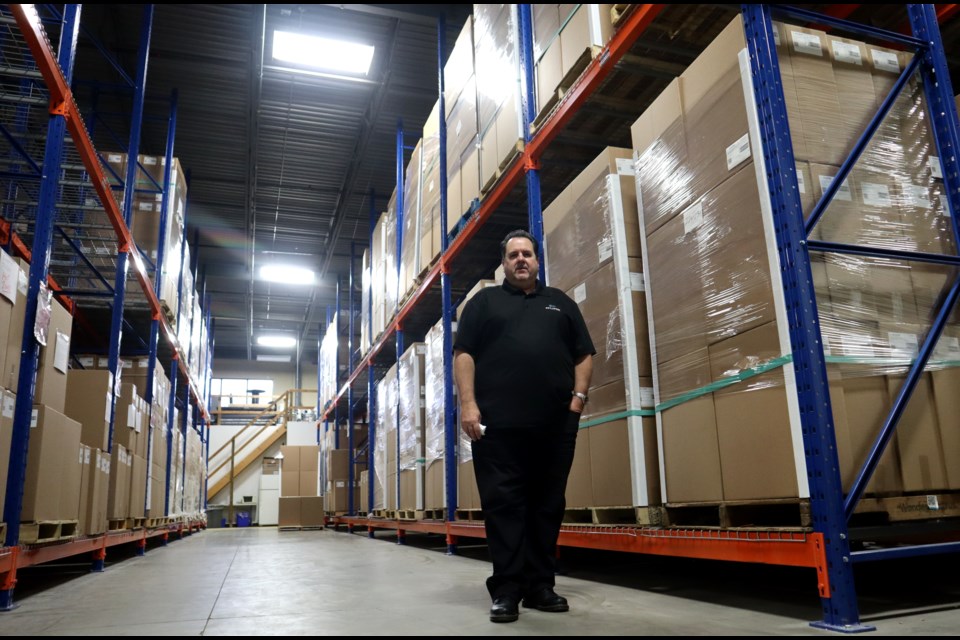A group of Canadian companies that make personal protective equipment says a proliferation of low-quality, foreign-made masks and respirators continue to fill shelves in some Ontario healthcare settings while abundant supply of the life-saving equipment languishes in local warehouses.
Barry Hunt, who leads the Canadian Association of PPE Manufacturers (CAPPEM) and runs Cambridge-based healthcare equipment manufacturer Prescientx, says the problem was created when the province failed to follow its own procurement policies at the outset of the pandemic.
Caught in a crunch, the province started panic-buying inferior PPE from overseas.
“It was overpriced and a lot of the stuff that was coming in was counterfeit and defective," said Hunt, who formed CAPPEM last year to combat problems Canadian PPE manufacturers were seeing at the provincial level.
"Those products are still on the shelf, in hospitals and schools," Hunt said. "It was an absolute disaster."
As auditor general Bonnie Lysyk outlined in her most recent report, the province had ignored a plan developed from the SARS Commission’s Final Report and didn't have enough PPE in stock when the pandemic took hold.
“An inadequate supply of PPE contributed to a higher risk of COVID-19 exposure for many health-care workers,” Lysyk said in her recent report, which includes a series of recommendations to support a safe and reliable supply of PPE going forward.
Among her recommendations is a centralized procurement system to secure and manage PPE for the provincial emergency stockpile.
At the federal level, support for domestic PPE manufacturers got another boost last week when the House of Commons voted unanimously in favour of a policy to supply Canadian made PPE to all levels of the federal government by Jan. 31, 2022.
Hunt said he's hopeful the policy changes make a difference for Canadian manufacturers, adding the measures couldn't come at a more crucial time in the pandemic.
“As each variant comes out, transmissibility keeps ramping up,” Hunt said. “You need better masks.”
Last Friday, Ontario's chief medical officer of health Dr. Kieran Moore supported that notion with interim guidance requiring that all medical workers wear N95s when providing direct care to COVID-19 patients.
Hunt says Eclipse Innovations, another Cambridge PPE manufacturer and founding member of CAPPEM, could be among the biggest beneficiaries of a move by the province to better manage its supply.
Eclipse Automation is the parent company of Eclipse Innovations, which began to design and fabricate face masks and respirators in response to the pandemic in June of last year.
The company got a $1.4 million boost from the province in July 2020 to scale up its operations.
But a few months after Premier Doug Ford came to Cambridge to make that announcement, a huge problem came to light. The testing and certification required to sell the respirators wasn't available in Canada.
Eclipse Innovations couldn’t go the normal route and get certification from the National Institute for Occupational Safety and Health (NIOSH) because the US federal agency was swamped with domestic demand and was prioritizing US applications.
In response to emergency demand for PPE, Health Canada developed a "Made in Canada" solution for manufacturers to put on their labels and began issuing interim orders to Canadian manufacturers that met all NIOSH standards with their test data.
The Canadian Standards Association (CSA) Group also launched a new certification program for respirators, providing Canadian manufacturers with an alternative certification to NIOSH, while still upholding similar standards of safety, effectiveness and quality.
Unfortunately, said Eclipse Innovations general manager Rob Shwery, none of that was effectively communicated to hospitals and other healthcare settings, which continued to rely on NIOSH approval for the PPE they purchased.
Eclipse Innovations decided in April to donate 1.5 million of their surgical grade masks to businesses across Waterloo region through organizations like the Cambridge Chamber of Commerce.
They then exited the medical mask business to focus on respirators.
As Shwery explains, a medical mask provides protection from the person wearing it, but an N-95 respirator protects the person wearing it from airborne pathogens like COVID.
One of the main differences is fit. In addition to providing superior protection from airborne viruses, respirators hug the face with the help of head straps, eliminating the gapping that happens with most masks.
Those gaps can allow microscopic viruses to get into a person’s airways. People who wear respirators are forced to breathe in through the filtering media.
But nearly two years into the pandemic, their Cambridge warehouse remains packed to the rafters with hundreds of boxes of respirators and enough rolls of raw material to make millions more.
Shwery says it will continue to sit there until the province shines a light on outdated regulations that keep Canadian buyers from looking in their own country for abundant supply of the valuable PPE.
“What bothers me is that since the beginning of this year…we had about a million respirators sitting on the shelf and we could not move them into health care when there was a need,” Shwery said.
“Everyone was saying there’s no supply and we had supply but we had no path forward to get them into healthcare because of procurement issues, certification issues, supply chain issues.”
Shwery hopes the auditor general’s recommendations on how the province should proceed, combined with recent expert recommendations on the types of PPE we should all be wearing, leads to welcome changes in his industry.
There's no need to go offshore, he said.



